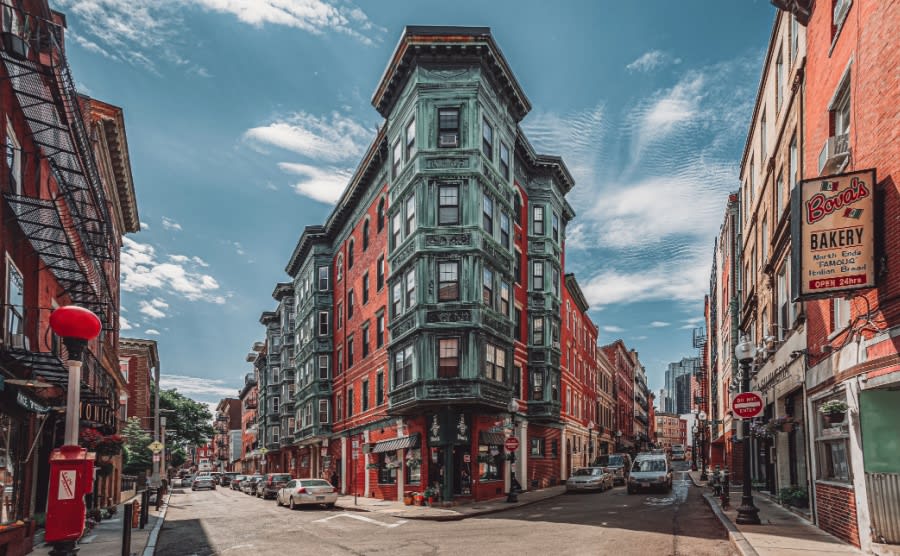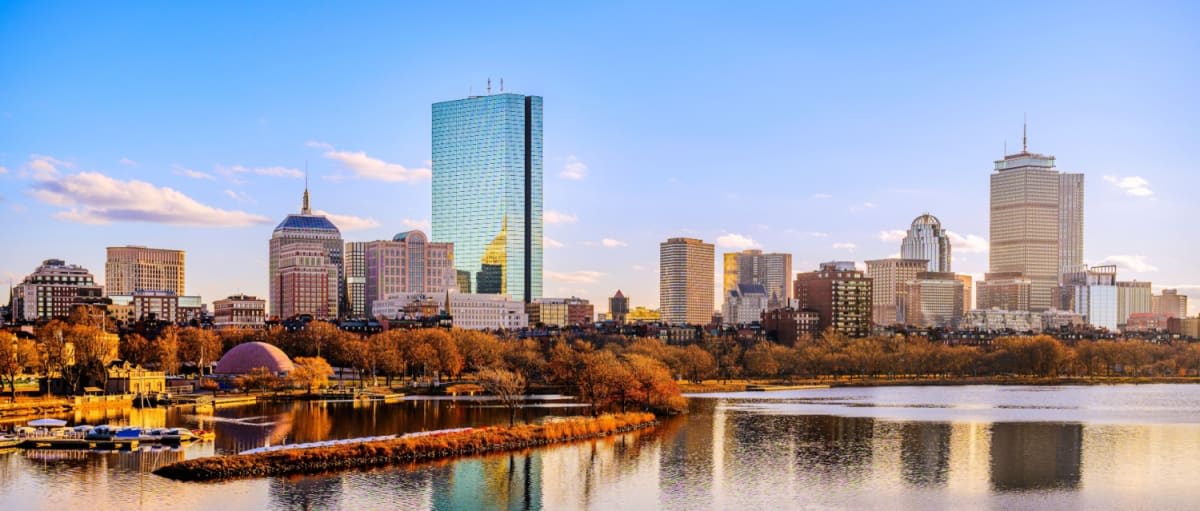Historic, cultured and globally connected, Boston stands out as one of the most desirable places to buy property in the United States. With its walkable neighbourhoods, world-renowned universities, and robust public infrastructure, if you buy property in Boston, you find a city that offers a uniquely European feel within an East Coast American setting.
Whether you’re relocating for work, buying a second home near one of Boston’s leafy parks, or investing in one of the city’s fast-moving rental markets, this article will walk you through everything you need to know in 2025. From understanding local property prices to navigating the legal process, we’ll help you take the next step with clarity and confidence.
Contents
- Why you should be buying property in Boston
- What to expect from the Boston property market
- Top neighbourhoods to consider
- Is buying property in Boston a good investment?
- The process of buying property in Boston
- Frequently asked questions

Why you should be buying property in Boston
Boston offers a rare mix of historical charm, modern infrastructure and international prestige – making it a compelling choice for overseas property buyers in 2025. Whether you’re seeking a second home in a walkable cultural capital or a long-term investment in a stable US city, Boston delivers on every front.
One of Boston’s most attractive features is its scale. Unlike many American cities built around car travel, Boston is famously compact, pedestrian-friendly and rich in architectural character. Its leafy residential streets, riverside parks and cobbled historic districts give it a European feel that appeals to international buyers. Add in a reliable public transport system (including subway, bus, ferry and commuter rail), and it’s easy to live without a car – a rarity in the United States.
Boston is also a global centre for education and healthcare. The city is home to world-class universities such as Harvard and MIT, as well as leading hospitals and research institutions affiliated with Harvard Medical School and Tufts University. This brings a steady population of students, professionals and academics, supporting long-term housing demand and a strong rental market.
For lifestyle buyers, Boston has much to offer. Cultural institutions, professional sports, fine dining and seasonal beauty draw people from across the US and abroad. From rowing on the Charles River in summer to leaf-peeping in the nearby Berkshires in autumn, Boston offers a distinctly New England lifestyle with global appeal.
Finally, Boston stands out for its economic resilience. With a diversified economy that spans tech, finance, biotech, higher education and healthcare, the city has weathered national downturns better than many metros. For overseas buyers seeking long-term stability in an English-speaking market with no foreign ownership restrictions, Boston is a smart and rewarding choice.
What to expect from the Boston property market
Boston’s property market remains remarkably stable in 2025, grounded in strong fundamentals, balanced supply, and resilient rental demand – making it a wise choice for discerning overseas buyers.
Strong rental market fundamentals
Multifamily housing in Boston continues to deliver robust performance. Average effective rents rose 2.3% year‑over‑year in 2024 – well above the national average of 1.0% – and are forecast to increase by 2.9% in 2025. Occupancy rates have remained firmly stable, with Q4 occupancy climbing 10 basis points year‑over‑year to approximately 96.5%. Submarkets across the region – from Back Bay and South End to North and East Boston – are sustaining high occupancy and steady rent growth.
Recent reports confirm continued absorption of new units, with over 1,300 units leased in Q1 2025, and 1,851 additional units absorbed in Q2. Although new construction remains active, it’s measured – Boston added ~7,200 new rental units in 2024, with about 7,000 more expected in 2025 – representing just 2.6% of total inventory and aligning with historical averages.
Healthy income and expense dynamics
On the financial front, net operating income (NOI) in Boston’s multifamily sector rose by approximately 6.4% in the year ending November 2024, reflecting effective rental strategies and cost control. Although some luxury properties are seeing slower rent growth due to added leasing incentives, Class B and C properties continue to yield solid returns.
Home prices: solid but competitive
Boston remains one of the priciest housing markets in the country. Zillow reports the average home value at approximately $780,000, a modest 0.9% increase over the past year. Redfin’s July 2025 data puts the median sale price slightly higher at $826,000, with homes selling in around 25 days – indicating a competitive but steady market. Neighborhood-specific prices reflect this premium: Back Bay averages $1.24 million; South Boston averages around $915K, though down slightly year‑over‑year; and broader Boston–Cambridge–Newton urban metrics hover near $733K.
Why it matters for overseas buyers
For international buyers, these figures signal a well-balanced market. High occupancy levels and moderate rental growth point to sustained demand and reliable income potential. The controlled pace of new supply reduces risks of oversupply shocks that have challenged other markets. Meanwhile, home prices – though elevated – have shown resilience rather than volatility, maintaining attractiveness for long-term investment.
In short, Boston offers stability, predictable cash flow, and gradual capital appreciation – making it a solid foundation for overseas purchasers looking to combine lifestyle value with financial prudence.

Top neighbourhoods to consider
Boston offers a wide array of neighbourhoods suited to different buyer profiles – from families and second-home seekers to investors and digital nomads. Each district has its own personality, price point and advantages. Here’s where to start your search in 2025:
Back Bay
One of Boston’s most prestigious addresses, Back Bay is known for its elegant brownstones, tree-lined streets and proximity to Boston Common and the Charles River Esplanade. It’s a top choice for second-home buyers who value character, centrality and exclusivity. Expect prices to start around $1.2 million, with waterfront homes commanding significantly more.
South Boston
Once working class, “Southie” has undergone extensive regeneration. It now combines traditional charm with sleek new-build apartments and excellent public transport links. Popular with young professionals and investors, South Boston offers proximity to the Financial District and waterfront. The median home value is around $890,000, with strong rental demand and walkable access to beaches and dining.
South End
Stylish and historic, South End is a hub for arts, culture and gastronomy. Its Victorian townhouses and converted lofts appeal to creatives and professionals alike. With average home values over $1 million, it’s well-suited to lifestyle buyers who want a cosmopolitan, central location with long-term value.
Bay Village
One of the smallest and most exclusive neighbourhoods in the city, Bay Village sits between Back Bay and the Theatre District. With narrow, quiet streets and red-brick townhouses, it’s ideal for buyers looking for tranquillity in the heart of Boston. Home values here average $1.23 million, making it one of the most desirable micro-neighbourhoods in the city.
North and South Dorchester
For those seeking value and long-term growth, Dorchester is a compelling option. These large and diverse neighbourhoods offer homes from around $675,000, well below the city average. With continued infrastructure investment and community development, Dorchester appeals to first-time overseas buyers and investors alike.
Chinatown / Leather District
Situated near South Station and Downtown Crossing, these areas attract buyers interested in walkable city living with easy access to transport and amenities. Home values in both areas hover around $950,000, with demand supported by their proximity to Boston’s financial, legal and tech hubs.
Roxbury
Roxbury offers an affordable entry point into Boston’s central property market, with median prices around $650,000. With ongoing urban renewal projects and a growing creative community, it’s gaining attention from buyers who want to balance city access with investment potential.
Each neighbourhood offers a different blend of character, convenience and community. Whether you’re after a luxury pied-à-terre, a family-friendly suburb or a high-yield rental, Boston’s diverse districts ensure there’s something for every overseas buyer in 2025.
Is buying property in Boston a good investment?
Boston remains one of the most attractive real estate markets in the United States for international investors in 2025. With strong economic fundamentals, high rental demand, and a relatively constrained housing supply, the city continues to offer stable, long-term opportunities for both capital appreciation and income generation.
Unlike some Sun Belt cities that have seen volatile post-pandemic price swings, Boston’s property market has shown steady growth underpinned by a diversified economy. The city is a global centre for higher education, life sciences, finance, and technology, providing a consistent stream of well-paid renters and homebuyers. Employers such as Harvard, MIT, Massachusetts General Hospital, and major biotech firms contribute to low unemployment and high housing demand – especially in neighbourhoods close to academic and medical hubs.
Foreign buyers also benefit from Massachusetts’ favourable legal framework. There are no restrictions on overseas ownership, and properties can be held in individual names or US-based entities. Rental income is subject to US taxation, but your liabilities can often be reduced with proper financial planning and the help of a tax adviser.
It’s worth noting that Boston is a high-cost market, with median sale prices around $826,000 citywide and well over $1 million in prime areas. However, this is balanced by rental resilience and low vacancy risk. Short-term lets are heavily regulated, so most investment returns come from long-term tenants or furnished rentals aimed at students, academics and professionals.
For buyers focused on financial performance, neighbourhoods like South Boston, Dorchester and Roxbury offer comparatively lower entry prices with solid growth prospects. Meanwhile, established districts such as South End and Beacon Hill remain safe bets for capital retention and prestige.
In short, Boston is not a speculative market – it’s a secure, high-demand city where property holds its value and generates reliable income. For overseas buyers looking for long-term returns in a culturally rich, economically stable environment, it remains one of the most attractive destinations in the US.
The process of buying property in Boston
Buying property in Boston follows the same legal framework as the rest of Massachusetts and is straightforward when guided by trusted local professionals. While it differs in some key ways from the UK and Europe, international buyers will find the system transparent, secure, and relatively quick to complete.
1. Decide your goals and financing
Start by defining whether you’re buying for personal use, investment, or a combination of both. Consider your budget carefully – including closing costs, taxes, and currency exchange – and decide whether you’re buying with cash or financing through a lender. Mortgages are available to foreign buyers, though you may need to provide a larger deposit and supporting documents.
2. Appoint a real estate agent
In Massachusetts, most buyers work with a licensed estate agent known as a buyer’s agent. Their role is to help you identify suitable properties, negotiate on your behalf, and guide you through the process. They are paid by commission – typically 5–6% of the purchase price, split between the buyer’s and seller’s agents – which is usually covered by the seller.
3. Work with a real estate attorney
Unlike in some other US states, it is common – and advisable – for buyers in Massachusetts to appoint an attorney. Your lawyer will handle title checks, draw up contracts, and help protect your interests, particularly if you’re buying from overseas. They will also help explain unfamiliar terms like contingencies and escrow.
4. Make an offer and sign the purchase agreement
Once you’ve found a property, your agent will help you submit a written offer. If accepted, you’ll sign a purchase and sale agreement. At this stage, you’ll typically pay an earnest money deposit – often 5–10% – into an escrow account. The contract may include conditions (known as contingencies), such as home inspection or mortgage approval.
5. Conduct due diligence
You’ll usually have the right to commission a home inspection and appraisal. Your attorney and agent will also carry out a title search and verify that there are no liens or legal issues affecting the property. If issues arise, you can usually renegotiate or walk away within the contingency period.
6. Plan your currency transfers
If you’re buying in US dollars but your funds are in pounds or euros, it’s essential to protect yourself from currency fluctuations. A forward contract from a currency specialist lets you lock in an exchange rate, ensuring your budget remains stable from offer to completion. Speak to Smart Currency Exchange to learn more about securing your funds.
7. Complete and close the sale
Final closing usually happens within 30–60 days of signing the purchase agreement. Your attorney will coordinate with the escrow agent to finalise documents, transfer funds and register the title. Once recorded, you’ll receive the keys and become the legal owner. Remote closings are possible for overseas buyers using secure power of attorney or notary services.
While buying property in Boston may involve more steps than you’re used to, it’s a well-regulated and buyer-friendly system – especially when supported by a professional team. Local agents, legal advisers and currency specialists will help ensure a smooth, stress-free purchase from offer to ownership.
Take the next step
Boston combines historic elegance with modern resilience, offering a unique opportunity for overseas buyers seeking long-term value, rental potential, and a high quality of life. With a stable housing market, strong tenant demand, and no restrictions on foreign ownership, the city is one of the most reliable destinations for property investment in the United States.
Whether you’re looking for a characterful brownstone in Back Bay, a sleek apartment near the Seaport, or an investment property with consistent returns, Your Overseas Home can help you every step of the way. Our team works with trusted local agents, legal advisers and currency specialists to make buying in Boston smooth, safe and stress-free.
Book your free property consultation to begin your Boston property journey with expert guidance.
Frequently asked questions
Can foreigners buy property in Boston?
Yes. There are no restrictions on foreign nationals buying property in Massachusetts. You can own real estate in your name or through a company, whether or not you are a US resident. However, it’s important to understand your tax obligations and visa status, especially if you plan to spend long periods in the US.
Is Boston a good place to buy rental property?
Absolutely. Boston has strong rental fundamentals, with occupancy rates consistently above 95% and annual rent growth forecast at 2.9% in 2025. Demand is driven by the city’s universities, hospitals and tech sector, creating reliable opportunities for long-term lets.
What are average property prices in Boston?
Citywide, the median home price is around $826,000. Prime neighbourhoods like Back Bay, South End and Bay Village often exceed $1 million, while more affordable options exist in areas like Roxbury and Dorchester, where prices start from around $650,000–$700,000.
How long does the property buying process take?
Most purchases close within 30–60 days from the date an offer is accepted. This includes the inspection period, legal due diligence and the transfer of funds. Remote closings are possible for overseas buyers using secure power of attorney or notary services.
Are there any extra costs I should budget for?
Yes. In addition to the property price, budget around 3–5% for closing costs, which include legal fees, title insurance, and local taxes. If you’re financing your purchase, there may be lender fees as well. Currency transfer fees can also add up—consider using a forward contract to lock in your exchange rate and protect your budget.







